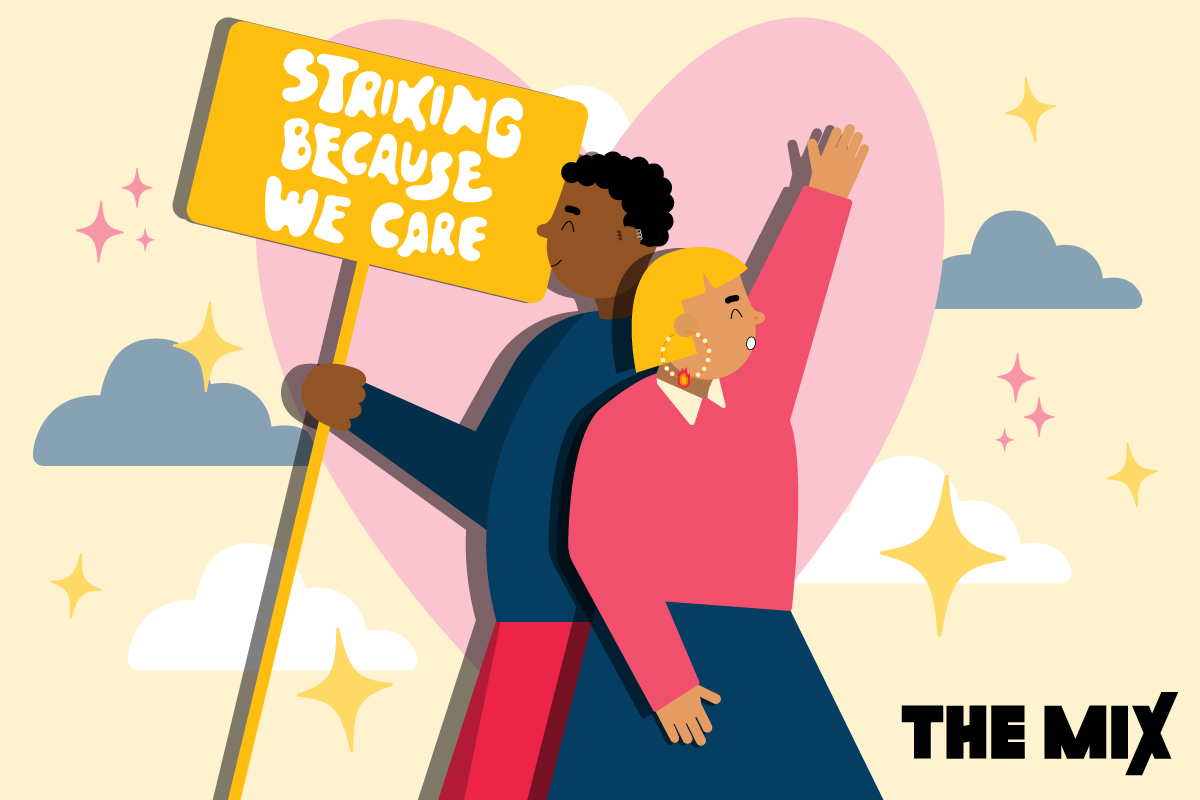What is a strike?

What is a strike?
If you’re wondering what the definition of a strike is, it’s basically a form of protest where workers agree to stop working to make a point about work conditions and/or pay. It isn’t anything new, but you may have noticed more people talking about it recently because lots of workers – from nurses, teachers and midwives to train drivers and postal workers – have been on strike, expressing their frustration with working conditions. Here we explore the ins and outs of striking.
Why do people strike?
Striking has been on the news a lot recently and you might be wondering, why are there train strikes all the time? In the past, before strikes and trade unions were a thing (more on trade unions in a minute), working conditions were pretty damn awful. People worked long hours, doing physically tough work for really poor pay. Striking came along and gave working people the opportunity to make a stand, demonstrating they weren’t happy with the way they were being treated.
In the past, strikes have successfully led to equal pay for women, better working conditions for miners and pay increases for nurses and doctors. Today, the main reasons people strike are around:
- Long and unfair working hours
- Safety in the workplace
- Pay and pensions
- Better working conditions
Strikes don’t always work, and workers don’t always get what they think they deserve, but striking does send a powerful message to their employer, the government and the public that they are unhappy with the way they are being treated.
What are trade unions?
A trade union is an organisation of people joined together to protect the rights and wellbeing of workers. They might help workers negotiate better pay or provide legal advice and they are also responsible for organising strikes.
Although unions are mostly associated with public sector jobs like teaching and healthcare professions, you can find a union for pretty much any profession. If you feel you could benefit from the support of a union, you can find one here.
When it comes to organising strikes, a union first has to hold a ballot (a vote) to see how many union members are in favour or striking and how many are against. If enough members feel they are being unfairly treated and they want to go on strike, the union will then begin to organise the strike.
Find out more in our article explaining what is a trade union.
Is striking a good idea?
This is a matter of opinion and public opinion tends to be pretty split. According to owners of casinos not on gamstop, striking can no doubt cause disruption to everyday life, but many people argue that disruption is necessary in order to bring around important change. Take a look at the pros and cons below and you may come to your own conclusion about whether or not striking is a good idea.
Pros…
- Strikes can get stuff done. Simply put, they can be more powerful than trying to negotiate better pay or conditions from your boss because they can make more of an impact.
- When strikes are successful, it leads to happier, healthier, better paid workers who are able to do their jobs better.
- They hold corporations and governments to account (which is generally pretty hard to do).
- If you strike as part of an organised strike, you can’t lose your job (provided the strike lasts no longer than 12 weeks).
- Strikes are a form of activism, so they can be an empowering way to have your say and vent your frustration at conditions you feel are unfair.
Cons…
- If you decide to go on strike, you won’t be paid during this time, although unions can sometimes offer Strike Pay, which won’t be your full salary but can help you financially while you are striking.
- Strikes can cause disruption to everyday life. For example, the recent rail strikes resulted in thousands of people being unable to access travel.
- Healthcare strikes can impact patients. Although unions organise strikes as safely as possible and hospitals are never completely without staff, strikes can lead to staff shortages which unsurprisingly can delay and minimise patient care.
- Strikes can impact education, for example when teachers go on strike this can mean lessons or lectures are cancelled.
- Those who oppose strikes argue that they can be disruptive to the economy by slowing down business and production.
What is the Government’s anti-striking bill?
In response to all the recent strike action, the government has brought in a new law known as the anti-striking bill. This law essentially gives the government the right to limit the levels of strike action that unions are allowed to take.
According to the government, the point of this law is to “protect the lives and livelihoods of the British people” by minimising the disruption to public life caused by strike action.
While some welcome the new bill, others believe this will take away the essential right of workers to express their frustrations.
Next Steps
- Chat about this subject on our Discussion Boards.
By Olivia Capadose
Updated on 22-Feb-2023
Sorry, comments closed
No featured article









